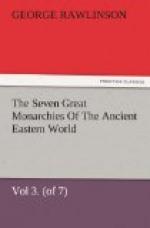princes were connected by marriage with the Cappadocian
kings; and their house was regarded as one of the
noblest in Western Asia. What the exact terms
were upon which they stood with the Median monarch
is uncertain. Herodotus regards Persia as absorbed
into Media at this time, and the Achsemenidse as merely
a good Persian family. Nicolas of Damascus makes
Persia a Median satrapy, of which Atradates, the father
of Cyrus, is satrap, Xenophon, on the contrary, not
only gives the Achajmenidae their royal rank, but
seems to consider Persia as completely independent
of Media; Moses of Chorene takes the same view, regarding
Cyrus as a great and powerful sovereign during the
reign of Astyages. The native records lean towards
the view of Xenophon and Moses. Darius declares
that eight of his race had been kings before himself,
and makes no difference between his own royalty and
theirs. Cyrus calls himself in one inscription
“the son of Cambyses, the powerful king.”
It is certain therefore that Persia continued to be
ruled by her own native monarchs during the whole
of the Median period, and that Cyrus led the attack
upon Astyages as hereditary Persian king. The
Persian records seem rather to imply actual independence
of Media; but as national vanity would prompt to dissimulation
in such a case, we may perhaps accord so much weight
to the statement of Herodotus, and to the general tradition
on the subject, as to believe that there was some kind
of acknowledgment of Median supremacy on the part
of the Persian kings anterior to Cyrus, though the
acknowledgment may have been not much more than a formality
and have imposed no onerous obligations. The residence
of Cyrus at the Median Court, which is asserted in
almost every narrative of his life before he became
king, inexplicable if Persia was independent, becomes
thoroughly intelligible on the supposition that she
was a great Median feudatory. In such cases the
residence of the Crown Prince at the capital of the
suzerain is constantly desired, or even required by
the superior Power, which sees in the presence of
the son and heir the best security against disaffection
or rebellion on the part of the father.
It appears that Cyrus, while at the Median Court,
observing the unwarlike temper of the existing generation
of the Medes, who had not seen any actual service,
and despising the personal character of the monarch,
who led a luxurious life, chiefly at Ecbatana, amid
eunuchs, concubines, and dancing-girls, resolved on
raising the standard of rebellion, and seeking at
any rate to free his own country. It may be suspected
that the Persian prince was not actuated solely by
political motives. To earnest Zoroastrians, such
as the Achgemenians are shown to have been by their
inscriptions, the yoke of a Power which had so greatly
corrupted, if it had not wholly laid aside, the worship
of Ormazd, must have been extremely distasteful; and
Cyrus may have wished by his rebellion as much to
vindicate the honor of his religion—as to




